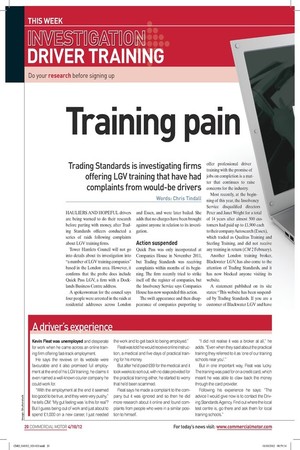Training pain
Page 14

Page 15

If you've noticed an error in this article please click here to report it so we can fix it.
Trading Standards is investigating firms offering LGV training that have had complaints from would-be drivers
Words: Chris Tindall
HAULIERS AND HOPEFUL drivers are being warned to do their research before parting with money, after Trading Standards officers conducted a series of raids following complaints about LGV training firms.
Tower Hamlets Council will not go into details about its investigation into “a number of LGV training companies” based in the London area. However, it confirms that the probe does include Quick Pass LGV, a firm with a Docklands Business Centre address.
A spokeswoman for the council says four people were arrested in the raids at residential addresses across London and Essex, and were later bailed. She adds that no charges have been brought against anyone in relation to its investigation.
Action suspended
Quick Pass was only incorporated at Companies House in November 2011, but Trading Standards was receiving complaints within months of its beginning. The firm recently tried to strike itself off the register of companies, but the Insolvency Service says Companies House has now suspended this action.
The swift appearance and then disappearance of companies purporting to offer professional driver training with the promise of jobs on completion is a matter that continues to raise concerns for the industry.
Most recently, at the beginning of this year, the Insolvency Service disqualified directors Peter and Janet Wright for a total of 14 years after almost 500 customers had paid up to £1,900 each to their company Autosearch (Essex), which traded as Qualitas Training and Sterling Training, and did not receive any training in return (CM 2 February).
Another London training broker, Blackwater LGV, has also come to the attention of Trading Standards, and it has now blocked anyone visiting its website.
A statement published on its site states: “This website has been suspended by Trading Standards. If you are a customer of Blackwater LGV and have paid money to the business, then you may wish to contact Consumer Direct for advice on your consumer rights.” There has been some success in improving standards in the sector. In 2011 Trading Standards prosecuted Hardeep Bharya, who ran a firm called Highlife HGV based at 1 Canada Square in London.
Non-existent jobs
Bharya pleaded guilty at Thames Magistrates’ Court to three charges relating to advertisements for LGV driver vacancies.
The adverts included claims that it had 80,000 vacancies nationwide and the council says it also advertised nonexistent jobs.
Further investigations, coincidentally by Tower Hamlets council, showed that consumers had been lured into paying for training courses with promises of employment afterwards.
Bharya was fined a total of £4,000; £1,000 for each offence, plus prosecution costs of £1,000.
This case illustrates the powers Trading Standards departments across the country wield, but disgruntled customers have long been calling for regulation as well.
However, legitimate training providers argue that introducing more rules to curb cowboy firms won’t work. “I don’t necessarily think regulation is the answer,” says Sean Pargeter, who offers LGV training and writes a blog at hgvlgvtraining.co.uk, highlighting dodgy brokers.
“If you start saying all instructors must be qualified and all vehicles are maintained to certain standards it is not going to take the broker out of the mix. People are always going to fall for these brokers.” Pargeter adds: “It’s a really big problem. Thousands of people every year are getting spun and ripped off at the first port of call. What kind of an advertisement is that for the industry?
Due diligence
“Once they have your details then it’s game over. All you can do is provide the information and let them make a decision. A little bit of due diligence is needed.” The Trading Standards Institute (TSI) says people searching for training firms and brokers online “are more vulnerable” and that a little research is needed first before paying for anything.
A TSI spokeswoman adds: “Check you’re dealing with a legitimate company when you go online, and check that they have a proper address. People don’t check their receipt is for a proper address and they don’t pay for it on a credit card either. Check if they have a head office as well.” n










































